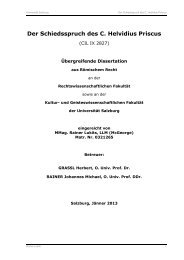(post) Keck Case Law on the Freedom to Provide Services
(post) Keck Case Law on the Freedom to Provide Services
(post) Keck Case Law on the Freedom to Provide Services
You also want an ePaper? Increase the reach of your titles
YUMPU automatically turns print PDFs into web optimized ePapers that Google loves.
etween Member States. Also, in Commissi<strong>on</strong> v. Belgium (c<strong>on</strong>structi<strong>on</strong> sec<strong>to</strong>r) <strong>on</strong>e of <strong>the</strong>underlying thoughts seemed <strong>to</strong> be discrimina<strong>to</strong>ry treatment. A.G. Tizzano argued that:“It cannot be ruled out, and even <strong>the</strong> Commissi<strong>on</strong> does not, in <strong>the</strong>ory, exclude this,that, although <strong>the</strong> rules at issue appear <strong>to</strong> apply without discriminati<strong>on</strong>, <strong>the</strong>y are infact discrimina<strong>to</strong>ry. (…) Unregistered opera<strong>to</strong>rs will, in effect, be (almost)exclusively foreign opera<strong>to</strong>rs, and, in particular, those wishing <strong>to</strong> provide servicesin Belgium <strong>on</strong>ly <strong>on</strong> an occasi<strong>on</strong>al basis, whereas nati<strong>on</strong>al opera<strong>to</strong>rs will be(almost) always registered as c<strong>on</strong>trac<strong>to</strong>rs as <strong>the</strong>y have <strong>to</strong> meet that requirementspecifically in order <strong>to</strong> be able <strong>to</strong> pursue <strong>the</strong>ir activities in Belgium.” 138The focus <strong>on</strong> discriminati<strong>on</strong> with regard <strong>to</strong> market access can also be found in casesdealing with advertising prohibiti<strong>on</strong>s. Restricti<strong>on</strong>s of advertising are generally c<strong>on</strong>sidered<strong>to</strong> be selling arrangements. 139 Never<strong>the</strong>less, <strong>the</strong> Court will find a breach of Art 34 or Art56 TFEU, if <strong>the</strong> prohibiti<strong>on</strong> has <strong>the</strong> effect of treating products or services from ano<strong>the</strong>rMember State less favourably. Because advertising is an effective means of penetrating aforeign market and of competing with established and well known domestic products, <strong>the</strong>Court has shown its willingness <strong>to</strong> find a discrimina<strong>to</strong>ry treatment. This had primarilybeen <strong>the</strong> case in decisi<strong>on</strong>s more closely related <strong>to</strong> goods 140 , but recently also in <strong>the</strong> field of138Opini<strong>on</strong> in <str<strong>on</strong>g>Case</str<strong>on</strong>g> C-433/04, Commissi<strong>on</strong> v. Belgium (c<strong>on</strong>structi<strong>on</strong> sec<strong>to</strong>r), [2006] ECR I-10653, para 36.139However, <strong>the</strong> Unfair Commercial Practices Directive 2005/29/EC, [2005] OJ L149/22 harm<strong>on</strong>isedcertain aspects of advertising c<strong>on</strong>cerning comparative and misleading advertising.140<str<strong>on</strong>g>Case</str<strong>on</strong>g> C-412/93, Leclerc-Siplec, [1995] ECR I-179; <strong>the</strong> freedom <strong>to</strong> provide services was not discussedbecause of <strong>the</strong> lack of a cross-border element, see <strong>to</strong> that <strong>the</strong> case note of Idot, 33 CML Rev. (1996),42




